Nutritional Considerations for Feeding Your German Shepherd a Raw Diet:
Hello German shepherd lovers, today I will explain in detail about the Raw Diet For German Shepherd.
Welcome to our guide on raw diets for German Shepherds. In this article, we’ll explore the world of raw feeding and how it can benefit your German Shepherd. Whether you’re new to raw diets or considering switching your dog’s food, we’ll cover everything you need to know to make informed decisions about your furry friend’s nutrition.
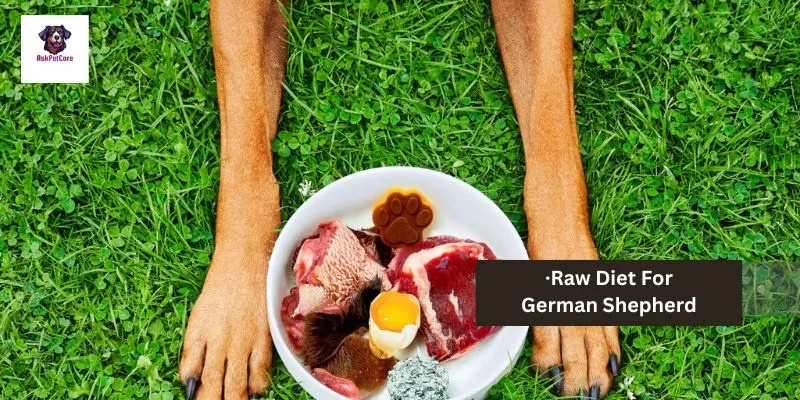
Hello everyone who loves dogs! I’m Dr. Arif Aziz, and I’ve been taking care of pets especially dogs at my clinic for a long time, exactly 14 years! I’m here to share some valuable information with you that I’ve gathered from books during my study time written by experts in veterinary medicine (DVM) and MSC (Master of Science), as well as from my own experiences working with dogs.
Addressing Common Questions and Concerns:
You might be wondering, “What exactly is a raw diet, and is it safe for my German Shepherd?” A raw diet consists of feeding your dog raw, uncooked ingredients like meat, bones, fruits, and vegetables, instead of traditional commercial dog food. Many dog owners choose raw diets because they believe it closely mimic what dogs would eat in the wild, providing them with essential nutrients and promoting overall health.
However, you might have concerns about the safety of raw feeding, such as the risk of bacterial contamination or nutritional imbalances. While it’s true that raw diets require careful handling to prevent foodborne illness, many advocates argue that with proper food sourcing, storage, and handling practices, the risk can be minimized. Additionally, working with a veterinarian or canine nutritionist can help ensure your German Shepherd’s raw diet is balanced and meets their nutritional needs.
Overall, raw feeding is a personal choice that requires careful consideration and research. By understanding the benefits and potential risks, you can make an informed decision that’s best for your German Shepherd’s health and well-being. So let’s dive in and explore the world of raw diets for German Shepherds together!
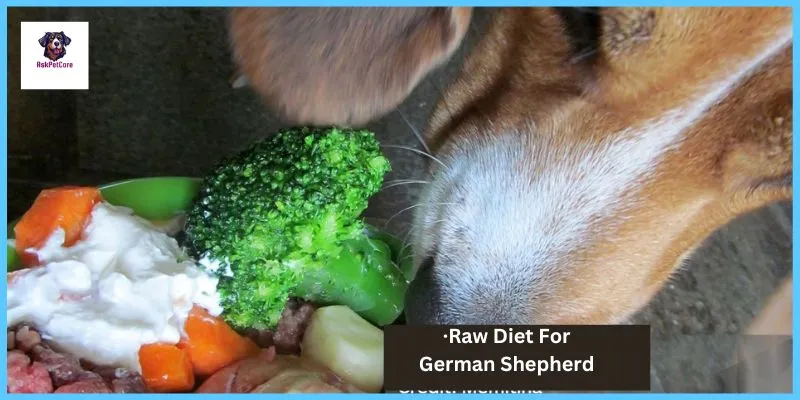
Benefits of a Raw Diet for German Shepherds:
Raw diets for German Shepherds offer a range of potential health benefits that can contribute to their overall well-being. Let’s take a closer look at some of these benefits:
Improved Digestion: One of the key advantages of feeding your German Shepherd a raw diet is improved digestion. Raw foods are often easier for dogs to digest compared to processed kibble, which can contain fillers and additives that may irritate their digestive systems. This can lead to fewer instances of bloating, gas, and stomach upset, resulting in a happier and more comfortable pup.
Healthier Coat: Another benefit of a raw diet is a healthier coat. Raw foods are rich in essential fatty acids, vitamins, and minerals that promote skin and coat health. German Shepherds are known for their luxurious double coats, and feeding them a raw diet can help maintain a shiny, lustrous coat that’s less prone to shedding and dryness.
Increased Energy Levels: Many German Shepherd owners report that their dogs have increased energy levels and vitality when switched to a raw diet. This is likely due to the high-quality, bioavailable nutrients found in raw foods, which provide a natural source of energy to fuel your dog’s active lifestyle. With improved energy levels, your German Shepherd may be more eager to play, exercise, and engage in training activities.
Essential Nutrients: Raw diets can provide essential nutrients that may be lacking in processed foods. Fresh meat, organs, and bones are rich sources of protein, vitamins, and minerals that are vital for your German Shepherd’s growth, development, and overall health. By feeding your dog a balanced raw diet, you can ensure they’re getting all the nutrients they need to thrive.
In summary, feeding your German Shepherd a raw diet can offer numerous health benefits, including improved digestion, a healthier coat, increased energy levels, and access to essential nutrients. By providing your dog with wholesome, natural ingredients, you can support their health and happiness for years to come.
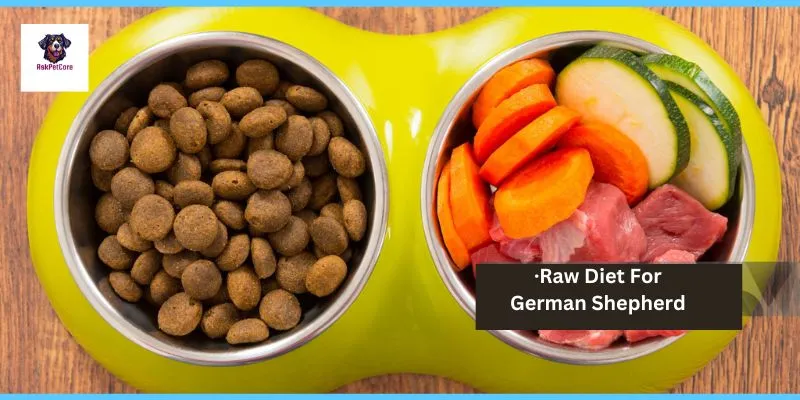
Now understand fifteen raw diet ingredients commonly used for feeding dogs:
Chicken
Beef
Turkey
Lamb
Pork
Fish (such as salmon or mackerel)
Organ meats (liver, kidney, heart)
Eggs (including the shell for added calcium)
Green tripe (unprocessed stomach lining)
Duck
Venison
Bison
Rabbit
Apples
Carrots
These ingredients provide a variety of proteins, essential fatty acids, vitamins, and minerals necessary for a balanced raw diet for dogs. Remember to consult with a veterinarian or canine nutritionist to ensure the diet meets your dog’s specific nutritional needs.
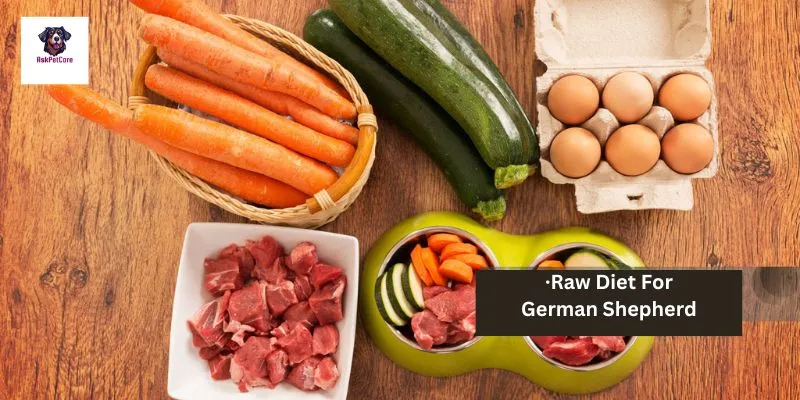
Now explore ten detailed benefits of a raw diet for German Shepherds:
Improved Digestion: Raw diets are often easier for German Shepherds to digest compared to processed foods. They contain natural enzymes and moisture that support healthy digestion, reducing the likelihood of bloating, gas, and stomach upset.
Healthy Skin and Coat: A raw diet provides essential fatty acids, vitamins, and minerals that promote skin and coat health in German Shepherds. This can result in a shiny, lustrous coat that’s less prone to shedding and dryness.
Increased Energy Levels: German Shepherds fed a raw diet often exhibit increased energy levels and vitality. The high-quality nutrients found in raw foods provide a natural source of energy, fueling your dog’s active lifestyle and improving their overall stamina.
Reduced Allergies: Many German Shepherds suffer from food allergies or sensitivities to common ingredients found in processed foods. A raw diet eliminates these potential allergens, reducing the risk of allergic reactions and skin irritations.
Stronger Immune System: Raw diets contain natural antioxidants, vitamins, and minerals that support a strong immune system in German Shepherds. This can help them better resist infections, illnesses, and chronic diseases, leading to improved overall health and longevity.
Healthy Weight Management: Raw diets can help German Shepherds achieve and maintain a healthy weight. They are less likely to contain fillers, additives, and empty calories found in processed foods, making it easier to control portions and prevent obesity-related health issues.
Improved Dental Health: Chewing on raw bones and meat can help clean your German Shepherd’s teeth and gums, reducing the buildup of plaque and tartar. This can lower the risk of dental problems such as tooth decay, gum disease, and bad breath.
Enhanced Muscle Development: The high protein content in raw diets supports muscle development and maintenance in German Shepherds. This is essential for maintaining strong, lean muscles, especially in active and working dogs.
Better Nutrient Absorption: Raw diets provide nutrients in their natural, bioavailable forms, allowing German Shepherds to absorb them more efficiently. This ensures they receive maximum nutritional benefit from their food, supporting overall health and well-being.
Overall Health and Longevity: By providing German Shepherds with a diet that closely resembles what they would eat in the wild, raw diets can contribute to their overall health and longevity. They support optimal nutrition, digestion, and immune function, helping your dog live a happier, healthier life for years to come.
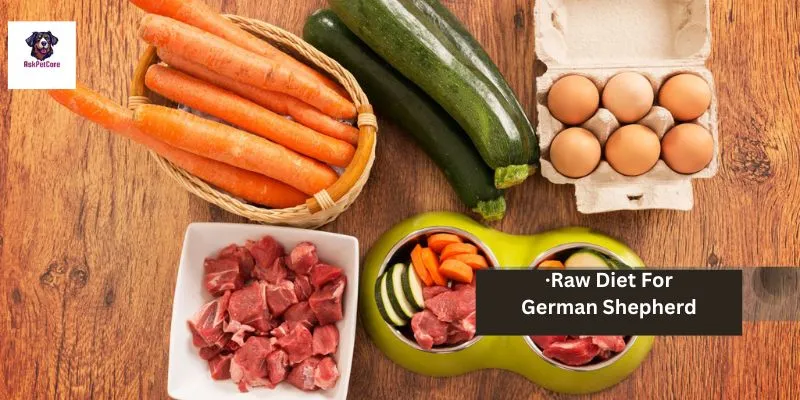
Here’s the information presented in a simple table format:
| Benefit | Description |
| Improved Digestion | Raw diets are easier for German Shepherds to digest, reducing the likelihood of bloating, gas, and stomach upset. |
| Healthy Skin and Coat | Raw diets provide essential fatty acids, vitamins, and minerals that promote healthy skin and a shiny, lustrous coat. |
| Increased Energy Levels | The high-quality nutrients in raw diets provide a natural source of energy, supporting German Shepherds’ active lifestyles and improving their overall stamina. |
| Reduced Allergies | Raw diets eliminate common allergens found in processed foods, reducing the risk of allergic reactions and skin irritations in German Shepherds. |
| Stronger Immune System | Natural antioxidants, vitamins, and minerals in raw diets support a strong immune system, helping German Shepherds resist infections and illnesses. |
| Healthy Weight Management | Raw diets make it easier to control portions and prevent obesity-related health issues, as they are less likely to contain fillers and empty calories. |
| Improved Dental Health | Chewing on raw bones and meat helps clean teeth and gums, reducing the buildup of plaque and tartar and lowering the risk of dental problems. |
| Enhanced Muscle Development | The high protein content in raw diets supports muscle development and maintenance, essential for maintaining strong, lean muscles in German Shepherds. |
| Better Nutrient Absorption | Raw diets provide nutrients in their natural, bioavailable forms, allowing German Shepherds to absorb them more efficiently for maximum nutritional benefit. |
| Overall Health and Longevity | By closely resembling a natural diet, raw diets contribute to German Shepherds’ overall health and longevity, supporting optimal nutrition, digestion, and immune function for a happier, healthier life. |
This table provides a concise overview of the benefits of a raw diet for German Shepherds, making it easy to understand and reference.
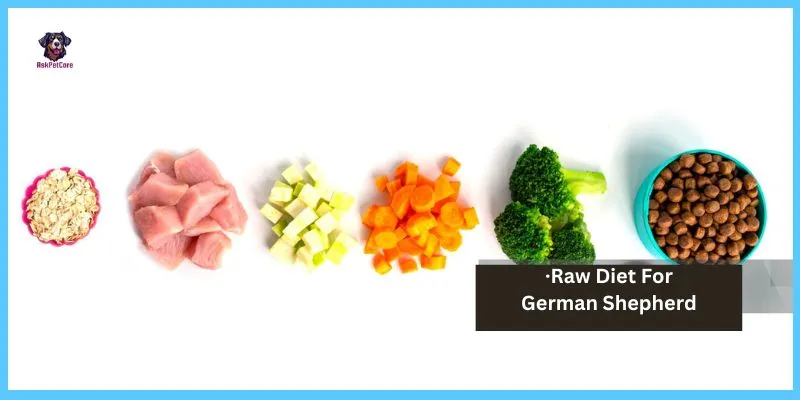
Now understand how a raw diet can provide essential nutrients that may be lacking in processed foods.
A raw diet can provide essential nutrients that may be lacking in processed foods primarily due to its composition of fresh, whole ingredients in their natural state. Let’s delve into the details:
Nutrient Density: Raw diets typically include a variety of fresh meats, organs, bones, fruits, and vegetables. These whole foods are naturally rich in essential nutrients such as protein, vitamins, minerals, and healthy fats. Unlike processed foods, which may contain fillers and additives, raw ingredients offer a higher nutrient density, providing a more concentrated source of essential nutrients per serving.
Bioavailability: The nutrients found in raw ingredients are often more bioavailable, meaning they are easier for the body to absorb and utilize. For example, the protein in raw meat is more readily digestible and absorbable compared to protein sources in processed foods that may undergo extensive cooking or extrusion processes. Similarly, vitamins and minerals in raw fruits and vegetables retain their natural forms, making them more bioavailable for absorption by the body.
Enzymes and Phytonutrients: Raw diets contain enzymes and phytonutrients that are naturally present in fresh, unprocessed foods. Enzymes play a crucial role in digestion and nutrient absorption, helping break down food into smaller, more easily absorbed components. Phytonutrients, found in fruits and vegetables, have antioxidant and anti-inflammatory properties that support overall health and immune function. These beneficial compounds may be reduced or destroyed during the processing of commercial pet foods.
Omega-3 Fatty Acids: Raw diets often include sources of omega-3 fatty acids such as fish and certain oils. Omega-3s are essential for skin and coat health, immune function, and inflammation regulation. While some commercial pet foods may contain added omega-3 supplements, the natural sources found in raw ingredients may offer superior bioavailability and effectiveness.
Variety and Balance: A well-planned raw diet includes a variety of protein sources, organs, bones, fruits, and vegetables to ensure a balanced nutrient profile. This variety helps provide a broad spectrum of essential nutrients, reducing the risk of nutrient deficiencies or imbalances commonly associated with highly processed or monotonous diets.
Preservation of Heat-Sensitive Nutrients: Raw diets preserve heat-sensitive nutrients that may be lost during the cooking or processing of commercial pet foods. Certain vitamins, such as vitamin C and some B vitamins, are more vulnerable to degradation when exposed to high temperatures. By feeding raw ingredients in their natural state, German Shepherds can benefit from the full spectrum of vitamins and minerals without the risk of nutrient loss due to heat processing.
Avoidance of Fillers and Additives: Processed pet foods often contain fillers, artificial flavors, colors, and preservatives to enhance palatability, texture, and shelf life. These additives may provide little to no nutritional value and can even be harmful to dogs with sensitivities or allergies. Raw diets, on the other hand, are free from these unnecessary additives, providing German Shepherds with clean, wholesome nutrition without the potential risks associated with artificial ingredients.
Promotion of Dental Health: Chewing on raw bones and meat can help maintain dental health in German Shepherds by reducing plaque and tartar buildup. The abrasive action of chewing on raw bones helps remove food particles and plaque from the teeth, preventing dental issues such as tooth decay, gum disease, and bad breath. Additionally, the natural enzymes and amino acids found in raw meat may support gum health and strengthen tooth enamel, promoting overall dental wellness.
Support for Joint Health: Raw diets often include sources of glucosamine and chondroitin, such as raw bones and cartilage. These compounds are essential for joint health and can help alleviate symptoms of arthritis and joint stiffness in German Shepherds, especially as they age. By providing these natural sources of joint-supporting nutrients, raw diets contribute to overall mobility and comfort, allowing German Shepherds to maintain an active and healthy lifestyle.
Enhanced Hydration: Raw diets have a higher moisture content compared to dry kibble, which can help promote hydration in German Shepherds. Adequate hydration is essential for proper digestion, nutrient absorption, and overall health. By consuming moisture-rich raw foods, German Shepherds can maintain optimal hydration levels, reducing the risk of urinary tract issues and supporting kidney function. Additionally, increased hydration can improve skin and coat health, leading to a shinier, healthier coat.
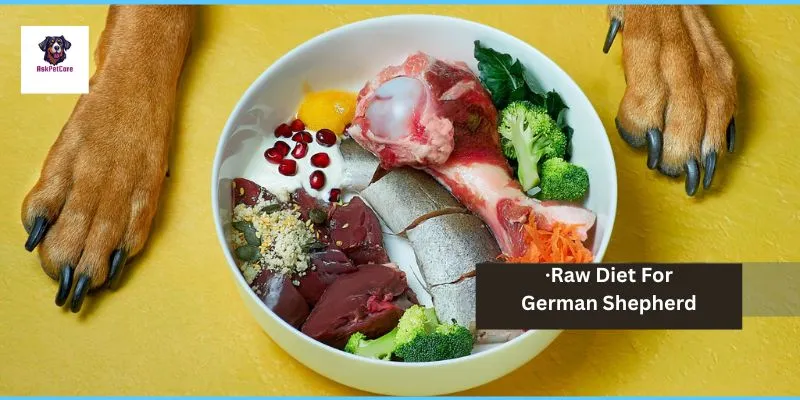
Here’s the information presented in a simple table format:
| Benefit | Description |
| Nutrient Density | Raw diets include fresh meats, organs, bones, fruits, and vegetables, naturally rich in essential nutrients like protein, vitamins, minerals, and healthy fats. |
| Bioavailability | Nutrients in raw ingredients are more easily absorbed and utilized by the body compared to those in processed foods, ensuring maximum nutritional benefit. |
| Enzymes and Phytonutrients | Raw diets contain enzymes for digestion and phytonutrients with antioxidant properties, supporting overall health and immune function. |
| Omega-3 Fatty Acids | Raw diets provide sources of omega-3 fatty acids, essential for skin, coat, immune function, and inflammation regulation, promoting overall health. |
| Variety and Balance | Well-planned raw diets offer a diverse mix of proteins, organs, bones, fruits, and vegetables, ensuring a balanced nutrient profile and reducing the risk of deficiencies or imbalances. |
| Preservation of Heat-Sensitive Nutrients | Raw diets retain heat-sensitive vitamins and minerals that may degrade during cooking or processing, preserving their nutritional integrity. |
| Avoidance of Fillers and Additives | Raw diets are free from fillers, artificial flavors, colors, and preservatives commonly found in processed foods, offering clean, wholesome nutrition without unnecessary additives. |
| Promotion of Dental Health | Chewing on raw bones and meat helps clean teeth and gums, reducing plaque and tartar buildup, and promoting overall dental wellness. |
| Support for Joint Health | Raw diets include sources of glucosamine and chondroitin, essential for joint health and mobility, and particularly beneficial for aging German Shepherds. |
| Enhanced Hydration | Raw diets have a higher moisture content than dry kibble, promoting hydration and supporting digestion, nutrient absorption, and overall health. |
This table provides a concise overview of the additional benefits of a raw diet for German Shepherds, making it easy to understand and reference.
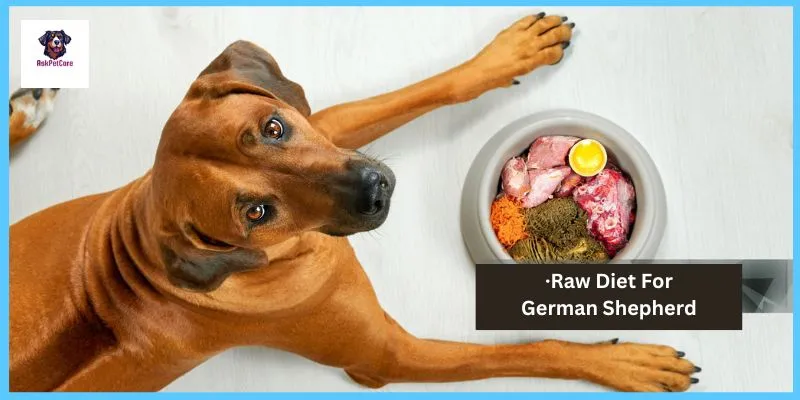
Now understand the pros and cons of the raw diet of a German shepherd in a simple table :
Here’s a simple table outlining the pros and cons of a raw diet for German Shepherds:
| Pros | Cons |
| 1. Improved digestion | 1. Risk of bacterial contamination |
| 2. Healthier skin and coat | 2. Potential for nutritional imbalances |
| 3. Increased energy levels | 3. Costlier than traditional kibble |
| 4. Reduced allergies | 4. Preparation time and effort required |
| 5. Stronger immune system | 5. Limited availability of ingredients |
| 6. Healthy weight management | 6. Potential for choking hazards |
| 7. Improved dental health | 7. Concerns about bones causing dental damage |
| 8. Enhanced muscle development | 8. Need for proper storage and handling of raw meat |
| 9. Better nutrient absorption | 9. Not suitable for all dogs, especially those with certain health conditions |
| 10. Support for joint health | 10. Lack of long-term research on the effects of raw diets |
| 11. Enhanced hydration | |
| 12. Avoidance of fillers and additives | |
| 13. Preservation of heat-sensitive nutrients | |
| 14. Variety and balance of natural ingredients | |
| 15. Potential for reduced stool odor |
These pros and cons provide a balanced overview of the considerations associated with feeding a raw diet to German Shepherds.
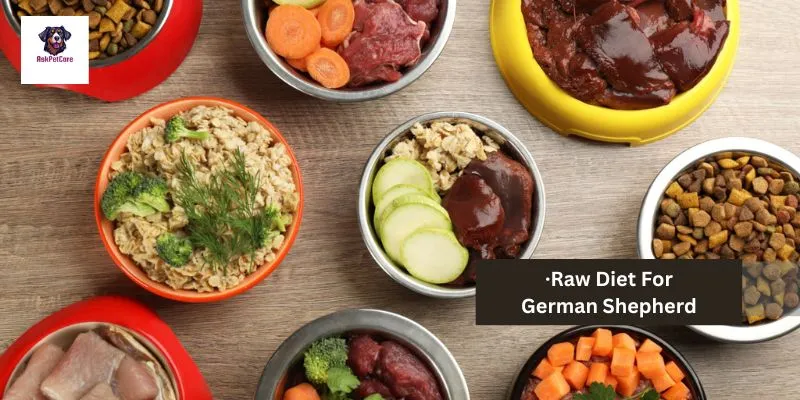
Now explore a Homemade raw diet for a German shepherd:
Here are five detailed considerations for creating a homemade raw diet for German Shepherds:
Protein Sources: Incorporate a variety of high-quality protein sources such as raw beef, chicken, turkey, lamb, and fish into your German Shepherd’s diet. These proteins should include muscle meat, organs (such as liver and kidney), and bones to ensure a balanced intake of essential amino acids, vitamins, and minerals. Aim for a ratio of approximately 80% muscle meat, 10% bone, and 10% organ meat to meet your dog’s nutritional needs.
Fruits and Vegetables: Include a selection of fresh fruits and vegetables to provide essential vitamins, minerals, and antioxidants. Suitable options for German Shepherds include leafy greens (such as spinach and kale), carrots, broccoli, blueberries, and apples. These ingredients can be finely chopped, pureed, or lightly cooked before serving to enhance digestibility and nutrient absorption.
Healthy Fats: Incorporate healthy fats into your German Shepherd’s diet to support skin and coat health, cognitive function, and overall well-being. Sources of healthy fats include omega-3-rich fish oil, coconut oil, and flaxseed oil. These fats can be added to your dog’s meals in small quantities to provide essential fatty acids and promote optimal health.
Supplements: Consider adding supplements to your German Shepherd’s homemade raw diet to ensure they receive all essential nutrients. Common supplements for raw-fed dogs include calcium (from ground eggshells or bone meal), vitamin E, vitamin D, and omega-3 fatty acids. Consult with a veterinarian or canine nutritionist to determine the appropriate supplements and dosages for your dog’s specific needs.
Food Safety: Practice proper food safety measures when preparing and handling raw ingredients to minimize the risk of bacterial contamination. Keep raw meats and organs refrigerated or frozen until ready to use, and wash hands, utensils, and surfaces thoroughly after handling raw ingredients. Additionally, ensure that your German Shepherd’s meals are served in clean bowls and that any uneaten portions are promptly discarded or refrigerated to prevent spoilage. By following these guidelines, you can provide your German Shepherd with a safe, nutritious homemade raw diet tailored to their individual needs.
Portion Control: Pay attention to portion sizes when feeding your German Shepherd a homemade raw diet. Determine the appropriate amount of food based on factors such as your dog’s age, weight, activity level, and metabolism. It’s essential to strike a balance between providing enough calories for energy and preventing overfeeding, which can lead to weight gain and related health issues.
Gradual Transition: Transition your German Shepherd to a homemade raw diet gradually to allow their digestive system time to adjust. Start by replacing a small portion of their current diet with raw food and gradually increase the amount over the course of several days to weeks. Monitor your dog for any signs of digestive upset, such as diarrhea or vomiting, and adjust the transition pace as needed to ensure a smooth switch to the new diet.
Variety in Texture and Temperature: Offer your German Shepherd a variety of textures and temperatures in their homemade raw diet to keep meals interesting and stimulating. Include raw meats, bones, organs, fruits, and vegetables in different forms, such as ground, diced, or whole. Additionally, consider serving some meals at room temperature and others slightly chilled or frozen to provide variety and encourage healthy eating habits.
Hydration: Ensure your German Shepherd stays adequately hydrated by providing access to fresh, clean water at all times. While raw foods contain moisture, they may not provide sufficient hydration on their own, especially during hot weather or periods of increased activity. Encourage your dog to drink water regularly throughout the day to prevent dehydration and support overall health and well-being.
Regular Monitoring and Adjustments: Monitor your German Shepherd’s health, behavior, and body condition regularly when feeding them a homemade raw diet. Pay attention to factors such as energy levels, coat condition, stool quality, and overall vitality. If you notice any changes or concerns, consult with a veterinarian or canine nutritionist to make appropriate adjustments to your dog’s diet to ensure they continue to thrive on a homemade raw feeding regimen.
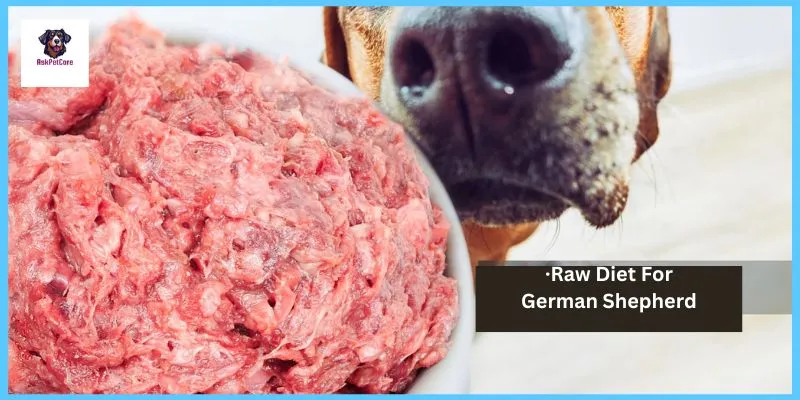
Here’s the information presented in a simple table format:
| Consideration | Description |
| Protein Sources | Include a variety of raw meats, organs, and bones to provide essential amino acids, vitamins, and minerals necessary for your German Shepherd’s health and well-being. Aim for a balanced ratio of muscle meat, bones, and organ meat. |
| Fruits and Vegetables | Incorporate fresh fruits and vegetables into your dog’s diet to provide vitamins, minerals, and antioxidants. These ingredients support overall health and may improve digestion and immune function. |
| Healthy Fats | Add sources of healthy fats such as fish oil, coconut oil, and flaxseed oil to promote skin and coat health, cognitive function, and overall well-being in your German Shepherd. |
| Supplements | Consider adding calcium, vitamin E, vitamin D, and omega-3 fatty acid supplements to ensure your dog receives all essential nutrients. Consult with a veterinarian or nutritionist to determine the appropriate supplements and dosages. |
| Food Safety | Practice proper food safety measures to minimize the risk of bacterial contamination. Keep raw ingredients refrigerated or frozen, wash hands and surfaces thoroughly, and discard any uneaten portions promptly to prevent spoilage. |
| Portion Control | Monitor portion sizes to prevent overfeeding and maintain a healthy weight for your German Shepherd. Adjust the amount of food based on factors such as age, weight, activity level, and metabolism. |
| Gradual Transition | Transition your dog to a homemade raw diet gradually to allow their digestive system time to adjust. Start by replacing a small portion of their current diet and gradually increase the amount over several days to weeks. |
| Variety in Texture and Temperature | Offer a variety of textures and temperatures in your dog’s meals to keep them interested and engaged. Include raw meats, bones, organs, fruits, and vegetables in different forms to provide variety and promote healthy eating habits. |
| Hydration | Ensure your German Shepherd stays hydrated by providing access to fresh, clean water at all times. Encourage regular drinking to prevent dehydration, especially during hot weather or increased activity. |
| Regular Monitoring and Adjustments | Monitor your dog’s health, behavior, and body condition regularly and make adjustments to their diet as needed. Consult with a veterinarian or nutritionist if you notice any changes or concerns. |
This table provides a concise overview of the considerations for creating a homemade raw diet for German Shepherds, making it easy to understand and reference.

Is a raw diet good for German Shepherds?
Let’s delve into the details of whether a raw diet is good for German Shepherds:
Pros of Raw Diet for German Shepherds:
Nutritional Benefits: A raw diet typically consists of fresh, whole ingredients such as raw meat, bones, organs, fruits, and vegetables. These foods are naturally rich in essential nutrients like protein, vitamins, minerals, and healthy fats. Feeding your German Shepherd a raw diet can provide them with a well-rounded nutritional profile that supports overall health and well-being.
Improved Digestion: Raw diets are often easier for dogs to digest compared to processed foods. This can be particularly beneficial for German Shepherds, who may be prone to digestive issues like bloating or gas. Raw foods contain natural enzymes and moisture, which can aid in digestion and contribute to a healthier gastrointestinal tract.
Healthier Skin and Coat: The nutrients found in raw ingredients, such as omega-3 fatty acids and vitamins, can promote healthy skin and a shiny coat in German Shepherds. Many owners report improvements in their dog’s coat condition, including reduced shedding and less dryness or itching, after switching to a raw diet.
Reduced Allergies: Some German Shepherds may have sensitivities or allergies to certain ingredients commonly found in processed pet foods, such as grains or artificial additives. Switching to a raw diet eliminates these potential allergens, reducing the risk of allergic reactions and skin irritations.
Increased Energy Levels: German Shepherds are known for their high energy levels and active lifestyles. The high-quality nutrients found in raw diets can provide them with the fuel they need to maintain their energy levels throughout the day. Many owners report that their dogs have increased stamina and vitality after transitioning to a raw diet.
Cons of Raw Diet for German Shepherds:
Bacterial Contamination: Raw meat carries a risk of bacterial contamination, including pathogens such as Salmonella and E. coli, which can pose health risks to both dogs and humans. Proper handling, storage, and hygiene practices are essential to minimize this risk.
Nutritional Imbalances: Without careful planning and formulation, raw diets may lack certain essential nutrients or be imbalanced in terms of protein, fat, and carbohydrate content. This can lead to nutritional deficiencies or excesses over time, potentially impacting your German Shepherd’s health.
Cost: Feeding a raw diet can be more expensive than feeding commercial kibble or canned food, particularly if you choose high-quality, organic ingredients. The cost of sourcing and preparing raw ingredients, as well as any supplements or veterinary consultations, should be taken into account when considering a raw diet for your German Shepherd.
Preparation Time and Effort: Raw diets require more preparation time and effort compared to feeding pre-packaged commercial foods. This includes sourcing fresh ingredients, portioning and preparing meals, and ensuring proper storage and hygiene practices are followed.
Potential Choking Hazards: Feeding raw bones as part of a raw diet carries a risk of choking or gastrointestinal obstruction, particularly if bones are fed in large chunks or if your German Shepherd is a fast eater. It’s essential to supervise your dog during meal times and choose appropriate bone sizes and types for safe consumption.
In summary, a raw diet can offer several potential benefits for German Shepherds, including improved nutrition, digestion, skin and coat health, energy levels, and allergy management. However, it’s essential to weigh these benefits against the potential risks and challenges associated with feeding raw, such as bacterial contamination, nutritional imbalances, cost, preparation time, and choking hazards. Before transitioning your German Shepherd to a raw diet, consult with your veterinarian to ensure it’s the right choice for your dog’s individual needs and circumstances.
How do I start my German Shepherd on a raw diet?
Starting your German Shepherd on a raw diet requires careful planning and a gradual transition to ensure a smooth adjustment. Here’s a step-by-step guide in simple English:
Research and Educate Yourself: Before starting your German Shepherd on a raw diet, take the time to research and educate yourself about the principles and guidelines of raw feeding. Learn about the nutritional requirements of dogs, the types of raw ingredients to include in their diet, and proper food handling and safety practices.
Consult with Your Veterinarian: Schedule a consultation with your veterinarian to discuss your decision to transition your German Shepherd to a raw diet. Your vet can provide personalized guidance based on your dog’s age, weight, health status, and any specific dietary needs or concerns. They may also recommend supplements or additional precautions based on your dog’s individual requirements.
Choose High-Quality Ingredients: Select high-quality, fresh ingredients for your German Shepherd’s raw diet. This includes raw meats (such as beef, chicken, turkey, and fish), organs (like liver and kidney), bones (raw and non-weight bearing), and a variety of fruits and vegetables. Aim for organic and human-grade ingredients whenever possible to ensure optimal nutrition and safety.
Plan Balanced Meals: Plan balanced meals that include a variety of protein sources, organs, bones, fruits, and vegetables to meet your German Shepherd’s nutritional needs. Aim for a ratio of approximately 80% muscle meat, 10% bone, and 10% organ meat in each meal. Consider rotating protein sources and incorporating different fruits and vegetables to provide a diverse range of nutrients.
Start with a Gradual Transition: Begin the transition to a raw diet gradually to allow your German Shepherd’s digestive system time to adjust. Start by replacing a small portion of their current diet with raw food, such as replacing one meal per day with a raw meal. Gradually increase the proportion of raw food while decreasing the amount of their previous diet over the course of several days to weeks.
Monitor Your Dog’s Response: Monitor your German Shepherd’s response to the transition to a raw diet closely. Watch for any signs of digestive upset, such as diarrhea, vomiting, or changes in stool quality. If you notice any issues, adjust the transition pace accordingly, slowing down or temporarily returning to their previous diet if necessary.
Hydration and Water Access: Ensure your German Shepherd has access to fresh, clean water at all times, especially during the transition to a raw diet. Raw foods contain moisture, but additional water intake is still essential to support hydration, digestion, and overall health.
Maintain Regular Veterinary Check-ups: Schedule regular veterinary check-ups to monitor your German Shepherd’s health and well-being while on a raw diet. Your vet can assess their weight, body condition, and overall health, and provide guidance or adjustments to their diet as needed to ensure they remain healthy and thriving.
By following these steps and taking a gradual approach, you can start your German Shepherd on a raw diet safely and effectively, providing them with the nutrition they need for optimal health and well-being.
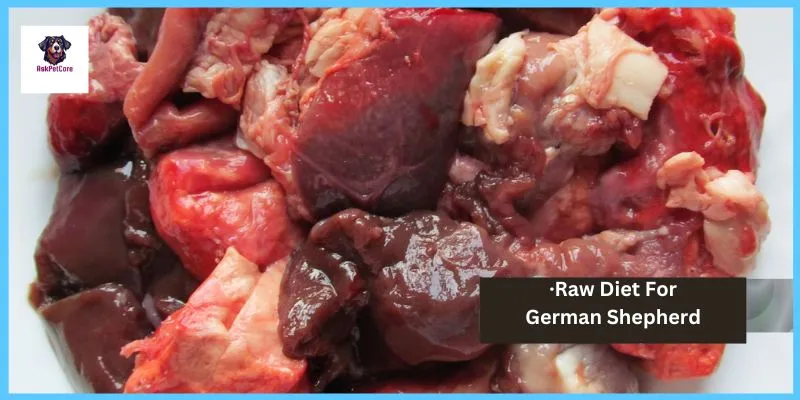
Can you feed a German Shepherd raw chicken?
Yes, you can feed a German Shepherd raw chicken as part of a balanced raw diet. Here’s a detailed explanation in simple English:
Benefits of Raw Chicken:
Nutritional Value: Raw chicken is a rich source of high-quality protein, essential amino acids, vitamins, and minerals that are beneficial for your German Shepherd’s health and well-being. It provides essential nutrients necessary for muscle development, energy production, and overall vitality.
Natural Enzymes: Raw chicken contains natural enzymes that aid in digestion and nutrient absorption in your dog’s gastrointestinal tract. These enzymes help break down food into smaller, more easily digestible components, allowing your German Shepherd to derive maximum nutritional benefit from their diet.
Healthy Fats: Chicken skin and fat contain healthy fats, including omega-3 and omega-6 fatty acids, which are essential for your German Shepherd’s skin and coat health, immune function, and inflammatory response. These fats support healthy skin, a shiny coat, and overall wellness.
Hydration: Raw chicken meat has a high moisture content, which contributes to your German Shepherd’s overall hydration levels. Adequate hydration is essential for proper digestion, nutrient absorption, kidney function, and overall health.
Natural Chewing Exercise: Feeding raw chicken with bones provides your German Shepherd with natural chewing exercise, which promotes dental health by reducing plaque and tartar buildup on their teeth. Chewing on raw bones can help keep their teeth clean and gums healthy, preventing dental issues such as tooth decay and gum disease.
Safety Considerations:
Bacterial Contamination: Raw chicken carries a risk of bacterial contamination, including pathogens such as Salmonella and E. coli, which can pose health risks to both dogs and humans. It’s crucial to handle raw chicken safely, following proper food safety practices to minimize the risk of bacterial transmission.
Bone Safety: When feeding raw chicken with bones, it’s essential to choose appropriate bone sizes and types to prevent choking, dental damage, or gastrointestinal obstruction. Avoid feeding cooked bones, as they can splinter and cause injuries or blockages in your German Shepherd’s digestive tract.
Variety and Balance: While raw chicken can be a nutritious component of your German Shepherd’s diet, it’s essential to provide a balanced variety of protein sources, organs, bones, fruits, and vegetables to ensure they receive all essential nutrients for optimal health. A balanced diet helps prevent nutritional deficiencies or imbalances over time.
In summary, feeding raw chicken to your German Shepherd can offer several nutritional benefits, including high-quality protein, natural enzymes, healthy fats, hydration, and dental health support. However, it’s crucial to handle raw chicken safely and ensure a balanced diet that meets your dog’s nutritional needs to promote overall health and well-being. Consulting with your veterinarian or a canine nutritionist can provide personalized guidance and recommendations for feeding raw chicken to your German Shepherd safely and effectively.
Now understand the best homemade raw diet recipes for German Shepherds:
- Chicken and Vegetable Mix: Ingredients:
1 pound of raw chicken (ground or diced)
1/2 cup of chopped carrots
1/2 cup of chopped spinach
1/4 cup of chopped apples
1 tablespoon of fish oil (as a supplement)
Instructions:
In a mixing bowl, combine the raw chicken, chopped carrots, spinach, and apples.
Mix the ingredients thoroughly to ensure even distribution.
If desired, add fish oil to the mixture as a supplement for omega-3 fatty acids.
Portion the mixture into serving sizes appropriate for your German Shepherd’s size and activity level.
Store the portions in airtight containers in the refrigerator or freezer until ready to serve.
- Beef and Sweet Potato Mash: Ingredients:
1 pound of raw beef (ground or diced)
1/2 cup of cooked sweet potatoes, mashed
1/4 cup of blueberries
1/4 cup of green beans, chopped
1 teaspoon of coconut oil (as a supplement)
Instructions:
Cook the sweet potatoes until tender, then mash them in a bowl.
In a separate mixing bowl, combine the raw beef, mashed sweet potatoes, blueberries, and chopped green beans.
Mix the ingredients thoroughly to create a uniform mixture.
Optionally, add coconut oil to the mixture as a supplement for additional healthy fats.
Divide the mixture into individual portions suitable for your German Shepherd’s needs.
Store the portions in airtight containers in the refrigerator or freezer until serving time.
- Fish and Vegetable Medley: Ingredients:
1 pound of raw fish (such as salmon or mackerel), diced
1/2 cup of cooked quinoa
1/4 cup of peas
1/4 cup of diced zucchini
1 tablespoon of flaxseed meal (as a supplement)
Instructions:
Cook the quinoa according to package instructions and let it cool.
In a mixing bowl, combine the diced raw fish, cooked quinoa, peas, and diced zucchini.
Mix the ingredients well to ensure even distribution.
Optionally, add flaxseed meal to the mixture as a supplement for omega-3 fatty acids.
Portion the mixture into appropriate serving sizes for your German Shepherd.
Store the portions in airtight containers in the refrigerator or freezer until mealtime.
- Turkey and Pumpkin Delight: Ingredients:
1 pound of raw turkey (ground or diced)
1/2 cup of canned pumpkin puree (unsweetened)
1/4 cup of blueberries
1/4 cup of steamed broccoli, chopped
1 teaspoon of olive oil (as a supplement)
Instructions:
In a mixing bowl, combine the raw turkey, canned pumpkin puree, blueberries, and chopped steamed broccoli.
Mix the ingredients thoroughly to ensure even distribution.
Optionally, add olive oil to the mixture as a supplement for additional healthy fats.
Divide the mixture into individual portions suitable for your German Shepherd’s needs.
Store the portions in airtight containers in the refrigerator or freezer until serving time.
- Lamb and Rice Bowl: Ingredients:
1 pound of raw lamb (ground or diced)
1/2 cup of cooked brown rice
1/4 cup of diced carrots
1/4 cup of chopped kale
1 tablespoon of coconut oil (as a supplement)
Instructions:
Cook the brown rice according to package instructions and let it cool.
In a mixing bowl, combine the raw lamb, cooked brown rice, diced carrots, and chopped kale.
Mix the ingredients well to ensure even distribution.
Optionally, add coconut oil to the mixture as a supplement for additional healthy fats.
Portion the mixture into appropriate serving sizes for your German Shepherd.
Store the portions in airtight containers in the refrigerator or freezer until mealtime.
These homemade raw diet recipes offer a variety of protein sources, fruits, vegetables, and supplements to provide balanced nutrition for your German Shepherd. Feel free to adjust the ingredients and portions based on your dog’s preferences and dietary needs. As always, consult with your veterinarian or a canine nutritionist before making significant changes to your dog’s diet.
Now understands how Transitioning to a Raw Diet •
Transitioning your German Shepherd to a raw diet requires patience and careful planning to ensure a smooth adjustment. Here’s a detailed explanation in simple English:
- Start Gradually: Begin by gradually introducing raw food into your German Shepherd’s diet while reducing the amount of their current food. Start with small portions of raw food mixed with their regular food, then gradually increase the proportion of raw food over the course of several days to weeks.
- Monitor Digestive Health: Watch for any signs of digestive upset, such as diarrhea or vomiting, during the transition period. If your German Shepherd experiences any digestive issues, slow down the transition process or temporarily revert to their previous diet until their stomach settles.
- Experiment with Texture: Some dogs may have preferences for certain textures or consistencies of food. Experiment with different types of raw food, such as ground meat, diced meat, or whole pieces with bones, to see what your German Shepherd prefers. Offering a variety of textures can help encourage acceptance of the raw diet.
- Be Patient: Transitioning to a raw diet may take time, especially if your German Shepherd is accustomed to a different type of food. Be patient and persistent, offering encouragement and positive reinforcement during meal times to help your dog adjust to the new diet.
- Address Food Aversions: If your German Shepherd shows reluctance or aversion to raw food, try adding small amounts of cooked meat or bone broth to entice them to eat. Gradually decrease the amount of cooked food as they become more accustomed to the raw diet.
- Ensure Proper Hydration: Make sure your German Shepherd has access to fresh, clean water at all times, especially during the transition period. Hydration is essential for digestion, nutrient absorption, and overall health, so encourage your dog to drink water regularly throughout the day.
- Consider Consulting a Professional: If you encounter challenges or have concerns during the transition process, consider consulting with a veterinarian or canine nutritionist for guidance and support. They can provide personalized recommendations and advice tailored to your German Shepherd’s individual needs and circumstances.
- Stay Consistent: Once your German Shepherd has successfully transitioned to a raw diet, maintain consistency by feeding them a balanced variety of raw foods and monitoring their health and well-being regularly. Consistency is key to ensuring the long-term success and benefits of a raw diet for your German Shepherd.
By following these tips and guidance, you can safely and gradually transition your German Shepherd to a raw diet, providing them with a nutritious and wholesome way of eating that supports their health and vitality.
Now Understand the Cost Considerations And Budgeting Of Raw Diet.
Feeding your German Shepherd a raw diet can be more expensive than feeding commercial kibble, but there are strategies to minimize costs while still providing a nutritious diet. Here’s a detailed explanation in simple English:
- Cost Comparison:
Raw Diet: The cost of feeding a raw diet typically includes raw meats, organs, bones, fruits, and vegetables, as well as any necessary supplements. These ingredients can vary in price depending on factors such as quality, sourcing, and availability.
Commercial Kibble: Commercial dog kibble is generally more affordable than raw ingredients. However, it may contain fillers, additives, and lower-quality ingredients that provide less nutritional value compared to a raw diet.
- Strategies for Budget-Conscious Pet Owners:
Buy in Bulk: Purchase raw ingredients in bulk quantities to take advantage of discounts and lower per-unit costs. Look for wholesale suppliers or local farmers who may offer better prices for larger purchases.
Use Affordable Protein Sources: Opt for affordable protein sources such as chicken, turkey, or pork, which are typically less expensive than premium meats like beef or lamb. Buying cuts with bones included can also help save money.
Shop Seasonally: Purchase fruits and vegetables that are in season, as they tend to be more affordable and readily available. Consider buying frozen produce, which can be cheaper than fresh and still retain nutritional value.
DIY Supplements: Instead of buying pre-made supplements, consider making your own using natural ingredients like fish oil, coconut oil, or ground flaxseeds. These alternatives can be more cost-effective while still providing essential nutrients.
Meal Prepping and Storage: Prepare larger batches of raw meals in advance and store them in the freezer for future use. This can help reduce waste and save time and money on daily meal preparation.
Consider Co-Ops or Group Buys: Joining a raw feeding co-op or participating in group buys with other pet owners can allow you to purchase raw ingredients at discounted prices by buying in bulk as a group.
Monitor Portion Sizes: Avoid overfeeding by monitoring portion sizes and adjusting them based on your German Shepherd’s age, weight, activity level, and metabolism. Feeding appropriate portion sizes can help stretch your budget further and prevent unnecessary waste.
By implementing these cost-saving strategies, budget-conscious pet owners can provide a nutritious raw diet for their German Shepherds without breaking the bank. It’s essential to prioritize your dog’s health and well-being while being mindful of your budget constraints. If you have any concerns about balancing cost and nutrition, consult with your veterinarian or a canine nutritionist for personalized guidance and recommendations.
Now Explores Some Common Concerns About Raw Diet.
Addressing common concerns about raw feeding for German Shepherds is important to ensure pet owners feel confident in their decision to feed a raw diet. Here’s a detailed explanation in simple English:
- Bacterial Contamination:
Concern: One of the main worries about raw feeding is the risk of bacterial contamination, such as Salmonella and E. coli, which can pose health risks to both dogs and humans.
Evidence-Based Information: While raw meat does carry a risk of bacterial contamination, dogs have a shorter digestive tract and higher stomach acidity compared to humans, making them better equipped to handle potential pathogens. Additionally, practicing proper food handling and hygiene, such as washing hands and surfaces thoroughly, and sourcing high-quality, fresh ingredients can minimize the risk of bacterial contamination.
- Nutritional Imbalances:
Concern: Some pet owners worry about providing a balanced diet when feeding raw, fearing their German Shepherd may develop nutritional deficiencies or imbalances.
Evidence-Based Information: A well-planned raw diet that includes a variety of protein sources, organs, bones, fruits, and vegetables can provide all the essential nutrients your dog needs. By following guidelines for balanced nutrition and offering a diverse range of raw ingredients, you can ensure your German Shepherd receives adequate nutrition to support their health and well-being.
- Choking Hazards:
Concern: Feeding raw bones as part of a raw diet may pose a choking hazard or risk of gastrointestinal obstruction.
Evidence-Based Information: While there is a potential risk of choking or obstruction with raw bones, feeding appropriate bone sizes and types, such as raw meaty bones that are size-appropriate for your dog’s breed and chewing habits, can minimize these risks. Additionally, monitoring your dog during meal times and selecting safe bone options, such as soft bones or recreational bones, can further reduce the likelihood of choking incidents.
- Evidence-Based Information:
Addressing concerns with evidence-based information helps alleviate fears and misconceptions surrounding raw feeding. Studies have shown that dogs fed a balanced raw diet can experience improved dental health, digestion, coat condition, and overall well-being compared to those fed commercial kibble. Additionally, the natural enzymes, nutrients, and bioavailability of raw ingredients contribute to better health outcomes for many dogs.
By providing evidence-based information and addressing common concerns, pet owners can feel more confident in their decision to feed a raw diet to their German Shepherds. It’s essential to weigh the potential benefits and risks of raw feeding while prioritizing your dog’s health and well-being. Consulting with a veterinarian or canine nutritionist can provide personalized guidance and support to ensure your German Shepherd receives a balanced and nutritious diet.
First Understands Some Best Practices for Raw Feeding •
Implementing best practices for raw feeding is essential to ensure the health and well-being of your German Shepherd. Here’s a detailed explanation in simple English:
- Portion Sizes:
When feeding a raw diet to your German Shepherd, portion sizes should be based on factors such as age, weight, activity level, and metabolism. As a general guideline, aim to feed approximately 2-3% of your dog’s body weight in raw food per day. Adjust portion sizes as needed to maintain a healthy weight and condition.
- Feeding Frequency:
Most adult German Shepherds thrive on two meals per day, while puppies may require three to four smaller meals to support their growth and development. Establish a consistent feeding schedule and avoid free feeding to help regulate your dog’s appetite and digestion.
- Food Safety Tips:
Practice proper food handling and hygiene when preparing and serving raw food to your German Shepherd. Wash hands, utensils, and surfaces thoroughly before and after handling raw ingredients to prevent cross-contamination.
Store raw ingredients in the refrigerator or freezer to maintain freshness and prevent spoilage. Thaw frozen raw food in the refrigerator or use cold water to avoid bacterial growth.
Use separate food bowls and utensils for raw feeding to minimize the risk of contamination with other foods or surfaces.
Discard any uneaten raw food after meal times to prevent bacterial growth and foodborne illness.
- Consulting with a Professional:
Before starting a raw diet for your German Shepherd, consult with a veterinarian or canine nutritionist to ensure it’s the right choice for your dog’s individual needs and circumstances. They can provide personalized guidance, recommend appropriate portion sizes and nutrient ratios, and address any concerns or questions you may have.
Regular veterinary check-ups are essential to monitor your German Shepherd’s health and well-being while on a raw diet. Your vet can assess their weight, body condition, and overall health and provide guidance or adjustments to their diet as needed.
By following these best practices for raw feeding, you can help ensure the safety, nutritional adequacy, and overall success of a raw diet for your German Shepherd. Prioritizing your dog’s health and well-being and seeking professional guidance when needed are key to providing a balanced and nutritious diet that supports optimal health and vitality.
- “Can German Shepherds eat raw chicken?”
Yes, raw chicken can be part of a balanced raw diet for German Shepherds, but it’s essential to ensure it’s fresh and properly handled to avoid contamination.
- “What vegetables are good for German Shepherds on a raw diet?”
Vegetables like carrots, spinach, broccoli, and sweet potatoes are nutritious options to include in a German Shepherd’s raw diet.
- “How much should I feed my German Shepherd on a raw diet?”
The amount of food depends on factors like age, weight, and activity level, but a general guideline is around 2-3% of their body weight per day.
- “Are raw bones safe for German Shepherds?”
Raw bones, like raw meaty bones from poultry or beef, can be safe for German Shepherds to chew on as part of their raw diet, but always supervise to prevent choking or dental issues.
- “What are the risks of feeding a raw diet to German Shepherds?”
Risks include potential bacterial contamination, unbalanced nutrition if not properly planned, and the possibility of bones causing gastrointestinal obstructions if not given appropriately. Consulting with a vet is crucial.
I hope you will thoroughly understand the raw diet for German shepherds in detail still any quarry contact me.
Here are some reference books that are considered authoritative on the topic of dog care, including nail care:
- “The Complete Dog Owner’s Manual” by Dr. Bruce Fogle
- “The Ultimate Guide to Dog Care: Everything You Need to Know to Keep Your Dog Happy and Healthy” by Amy Marder and Andrew Luescher
Disclaimer: This information is general advice only. Before starting any treatment or supplement with your pet, please consult your vet first for the best approach to getting your pet back to their best health.
Check with your veterinarian before giving any medication or supplement at home, to be sure it’s safe for your pup. Some substances can be toxic or harmful, including “dog-safe” medications and supplements if they are given at the wrong dosage.
